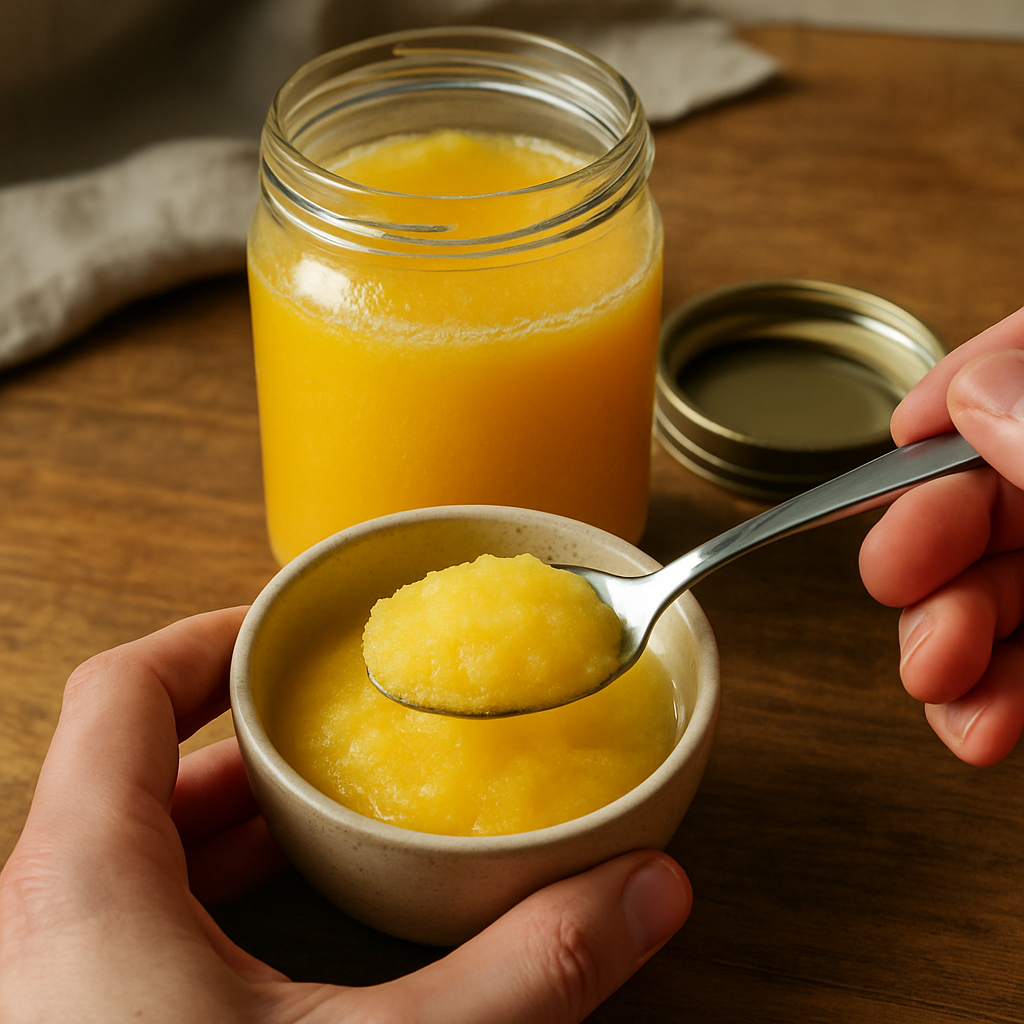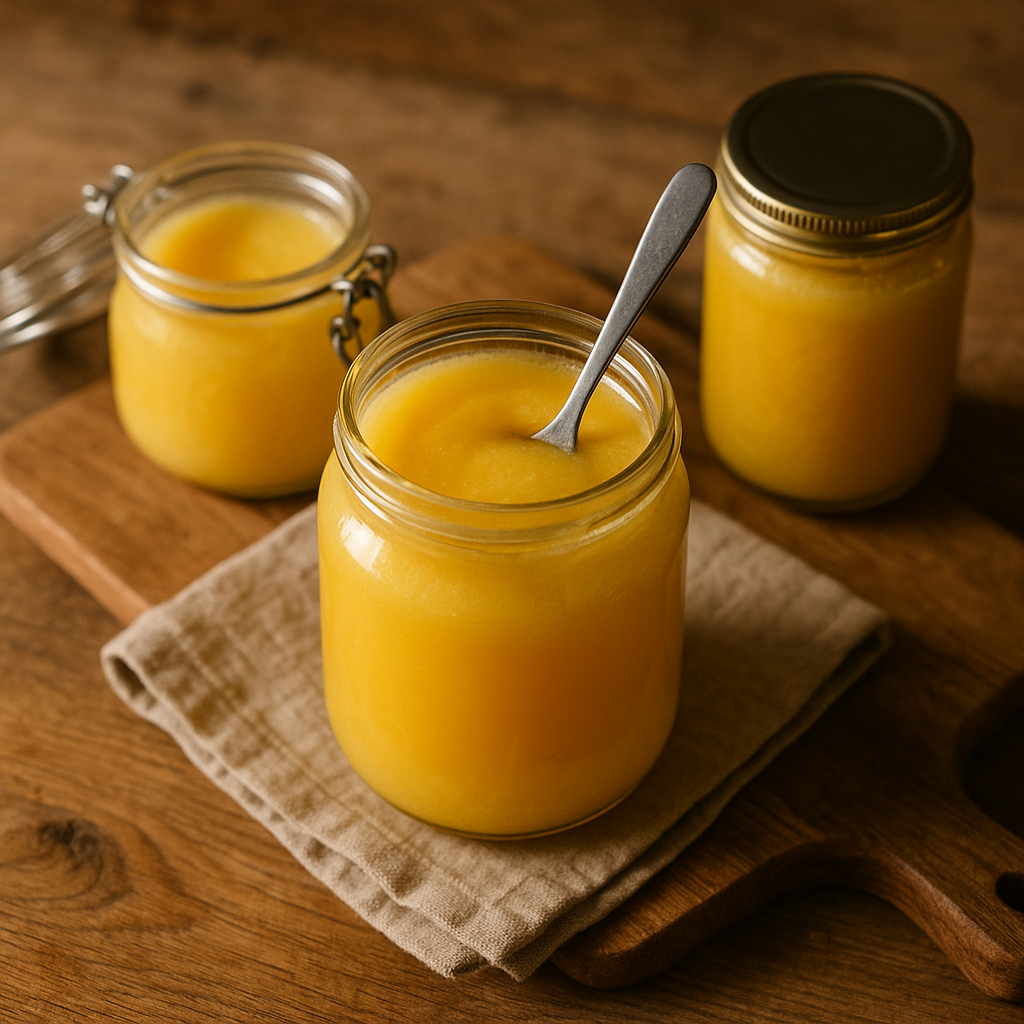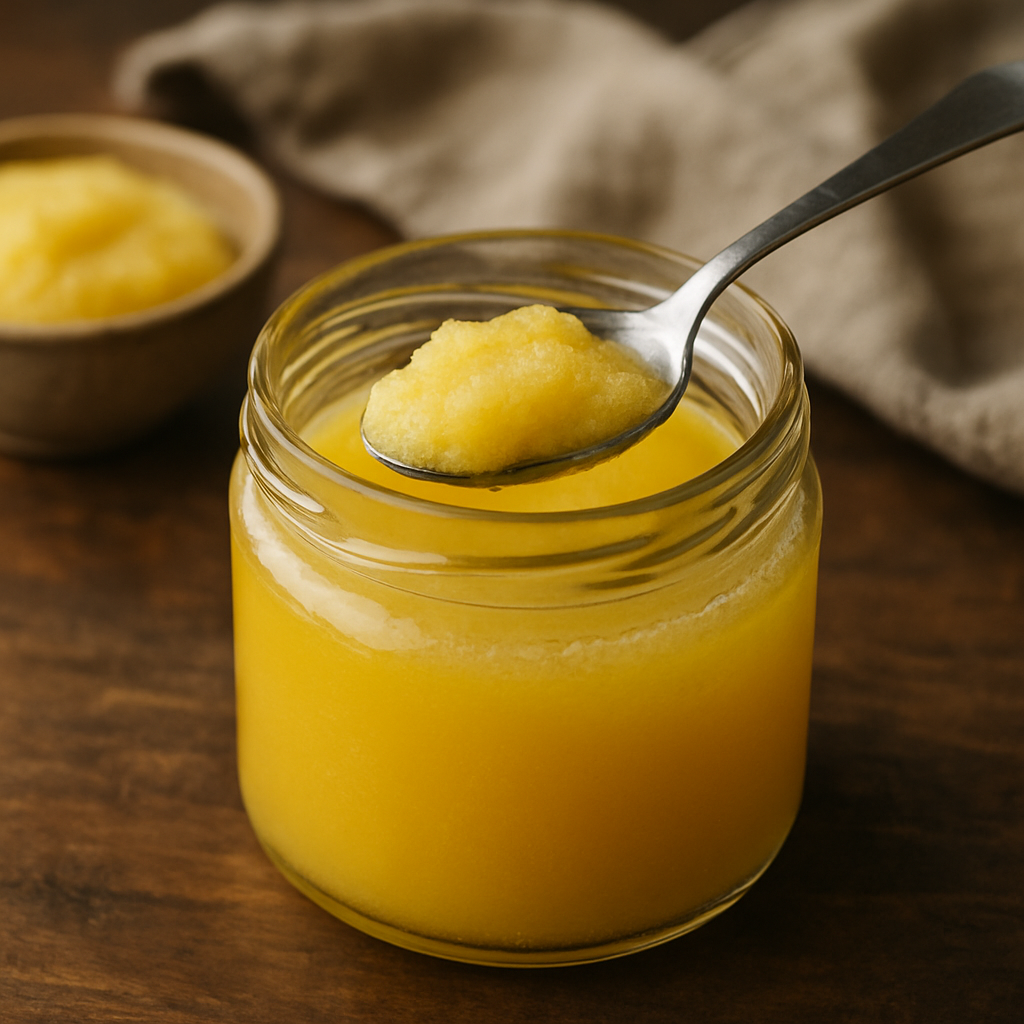Ask Ayurvedic doctor a question and get a consultation online on the problem of your concern in a free or paid mode. More than 2,000 experienced doctors work and wait for your questions on our site and help users to solve their health problems every day.
Is Ghee Good for Health? Ayurvedic Benefits and Daily Use

Is ghee good for health? If you've ever wandered through a health food aisle, chatted with a nutritionist, or scrolled Instagram wellness reels, you've probably heard that ghee is good for health. But what does that really mean? From Ayurvedic traditions to modern diets, ghee has made a big comeback — and for good reason.
The benefits of eating ghee daily are being rediscovered, not just by health-conscious foodies but by anyone curious about adding more wholesome fats into their life. But here’s the thing — not all ghee is the same, and not everyone should eat it the same way. You might be wondering: what are the benefits of ghee? which ghee is good for health? and even, how much ghee is good for health?
This article breaks it all down — from ghee’s ancient Ayurvedic roots to how it can improve your digestion, boost your skin glow, and more. Just don’t be surprised if you end up spreading a little on your toast tomorrow.
What Is Ghee and Its Role in Ayurveda
How Ghee Is Made and Used Traditionally
Ghee is essentially clarified butter. It's made by simmering unsalted butter slowly until the milk solids separate and brown at the bottom, then removing the clear golden fat on top. What’s left behind is pure ghee — rich, aromatic, and shelf-stable.
In Ayurvedic medicine, ghee is more than just a fat. It's considered sattvic, or life-giving. It’s used in cooking, massage, cleansing rituals, and even certain herbal remedies. It’s believed to nourish ojas — the essential energy or life-sap in the body.
And unlike modern processed oils, traditional ghee is free from hydrogenation, artificial additives, or preservatives. (Though let’s be honest — not all ghee on store shelves lives up to that standard.)
Ghee as an Ojas-Enhancing Superfood
One of the main reasons why ghee is good for health in Ayurveda is its ability to build ojas. In simple terms, ojas supports vitality, immunity, mental clarity, and emotional strength. When you eat high-quality ghee — especially from grass-fed cows — it’s thought to help lubricate the joints, nourish tissues, and support the subtle energies of the body.
Is pure ghee good for health, though? Absolutely — especially when it’s made the traditional way, from ethically sourced A2 cow milk. This type of ghee retains the healthy short-chain fatty acids like butyrate, which supports gut lining and digestion.

Don't wait or self medicate. Start chat with Doctor NOW
Is Ghee Good for Health?
Digestion, Immunity, Brain, and Skin Support
Here’s the thing — fat isn't the enemy. In fact, ghee contains healthy fats that are essential for brain function, hormonal health, and cell regeneration. Some of the top benefits of eating ghee daily include:
-
Improved digestion due to the presence of butyric acid.
-
Better absorption of fat-soluble vitamins like A, D, E, and K.
-
Boosted immunity and a calming effect on inflammation.
-
Cognitive support — healthy fats fuel brain function and mood.
And here’s a surprise: the benefits of ghee on face aren’t just hype. Used as a moisturizer, it can soothe dry patches, reduce inflammation, and even add a natural glow. (Just patch-test first if your skin is sensitive.)
But not all ghee is created equal. Which ghee is good for health — cow ghee or buffalo ghee? We’ll get to that in a bit.
Is Pure Ghee Better Than Processed Ghee?
Yes, by a landslide. Most commercial ghees are made with speed and profit in mind — using milk from factory-farmed animals or blending in palm oil (!!). On the other hand, pure desi ghee, made from grass-fed cow’s milk using traditional methods, is nutrient-dense and way more bioavailable.
So if you're wondering is eating ghee daily good for health, the answer leans towards yes — if it’s the real deal.

How to Use Ghee for Maximum Benefits
Ghee is versatile — and that’s part of its charm. Whether you stir it into morning tea (hello, bulletproof coffee alternative), drizzle it over rice, or slather it on your face before bed, there are multiple ways to tap into its natural goodness.
But to get the most out of it, you need to know how much ghee is good for health and which kind to actually buy.
How Much Ghee Is Good for Health Daily
This is a bit of a gray area, depending on your body type, activity level, and overall diet. But generally, Ayurveda recommends 1 to 2 teaspoons daily for most people. That’s enough to support digestion and nourish the tissues without overdoing it.
If you're active, pregnant, or recovering from illness, your body might benefit from a little more. But if you live a sedentary lifestyle or struggle with high cholesterol or fatty liver, moderation is key.
And don’t just slather it on everything. Combine it with warm, whole foods — like lentils, steamed veggies, or porridge. This makes it easier for your body to absorb the nutrients and stay in balance.
Funny enough, some people think adding ghee to fast food makes it “healthier.” Nope. That’s not how it works!
Benefits of Ghee on Face and External Use
This might surprise you: ghee isn’t just for eating. Using it externally can also bring visible benefits. Ghee is rich in antioxidants and fatty acids that deeply hydrate the skin. It's especially good for people with dry, cracked, or irritated skin.
Here's a quick DIY: Warm a little pure ghee between your fingers and dab it gently under your eyes or on dry cheeks. Leave it on overnight — just a thin layer — and rinse off in the morning. It's like an ancient Ayurvedic night cream.
Some people even use it on chapped lips or heels. Though yes, it can feel a bit greasy. If that bugs you, just use it sparingly.
The benefits of ghee on face include:
-
Deep moisturization without clogging pores (for most skin types).
-
Natural glow from vitamin E and fatty acids.
-
Soothing inflamed or wind-chapped skin.
Which Ghee Is Good for Health: Cow vs Buffalo
Now, this is a hot topic. Both have their place, but they’re not quite the same.
-
Cow ghee is lighter, easier to digest, and traditionally favored in Ayurveda. It's ideal for daily use and is packed with nutrients like omega-3s and butyrate.
-
Buffalo ghee, on the other hand, is thicker and heavier. It contains more fat, making it richer and better suited for folks needing extra calories or those with high physical activity levels.
So, which ghee is good for health? If you're looking for a general daily health boost — cow ghee wins. Especially the kind made from A2 milk (from native Indian cows like Gir or Sahiwal), which many believe is more nourishing and easier on the gut.
Look for labels that say “grass-fed,” “cultured,” or “hand-churned” if you can. They usually indicate a more traditional, nutrient-rich product.

When to Avoid or Limit Ghee Consumption
Okay, so ghee is a superfood — but that doesn’t mean it’s right for everyone all the time.
For people with certain health conditions, it’s best to approach ghee with a little caution. If you have high cholesterol, are overweight, or struggle with fatty liver disease, talk to your doctor before making ghee a daily thing. Ghee is calorie-dense and, although it contains healthy fats, too much of anything can throw the body off balance.
Also — and this is rarely mentioned — ghee can sometimes aggravate people with sluggish digestion or extreme Kapha dosha imbalances (in Ayurvedic terms). If you feel heavy or bloated after eating ghee, reduce the quantity or pause it for a while.
Another tip? Store it right. Leaving ghee open to air and moisture can cause it to spoil faster. That weird sour smell? Yeah, that’s not the “authentic aroma,” it’s just bad storage.
And don’t believe the myth that ghee never goes bad — it definitely can.
Conclusion
So, is ghee good for health? For most people — absolutely. When sourced and used properly, it offers a wide range of benefits that support digestion, skin, brain function, and overall vitality. Whether you're asking why ghee is good for health, is eating ghee good for health, or curious about its skincare potential, the answer often circles back to: yes, but with intention.
Ghee isn’t just a trendy ingredient — it’s a time-tested, Ayurveda-backed powerhouse. Just be mindful of quality, quantity, and your individual needs.
As for how much ghee is good for health, think of it like seasoning — a little goes a long way. And if you’re wondering is pure ghee good for health, remember: traditional, small-batch cow ghee (especially from grass-fed or desi cows) is your best bet.
Try adding it to your morning toast, your lentils, or even your skincare — just maybe not all on the same day 😉
FAQs
Q: Is eating ghee daily good for health?
A: Yes, for most people, 1–2 teaspoons a day of pure cow ghee can support digestion, energy, and immunity. But always consider your health status and lifestyle before making it a daily habit.
Q: Can ghee improve skin health when used externally?
A: Definitely. Ghee is rich in antioxidants and healthy fats that hydrate the skin, reduce inflammation, and give a natural glow. Just apply a small amount and avoid if you're acne-prone.
Q: What are the signs of too much ghee in the diet?
A: Feeling heavy, bloated, sluggish digestion, or unexplained weight gain might be signs you’re overdoing it. Cut back and see how you feel.
Q: Is pure ghee good for health?
A: Pure, traditionally made ghee from grass-fed cows is highly beneficial. It contains nutrients like butyric acid and omega-3s that support gut and brain health. Just avoid heavily processed or adulterated varieties.
Call to Action:
Curious to try ghee in your daily routine? Start small — experiment with a teaspoon on your rice or a dab on your dry skin. And if you found this guide helpful, share it with a friend or two. After all, real wellness spreads best when it’s shared 💛

